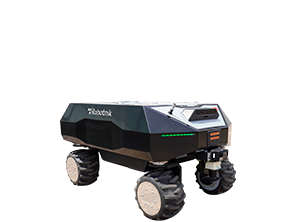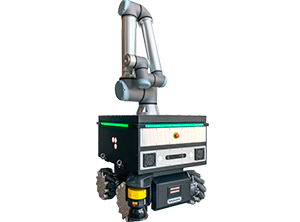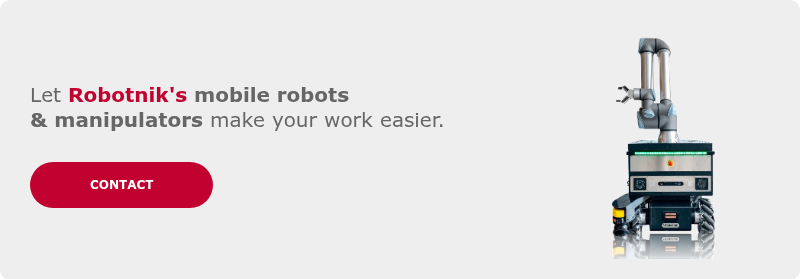The digital transformation of the automotive industry is not limited to manufacturing. Traditionally manual processes, such as vehicle washing and care, are increasingly incorporating mobile robotics and manipulation solutions that boost efficiency, improve safety, and optimize the use of resources.
In this context, ISTOBAL and Robotnik developed a project applying the Autonomous Mobile Manipulator RB-KAIROS+ to the vehicle washing sector, redefining automation in service environments.
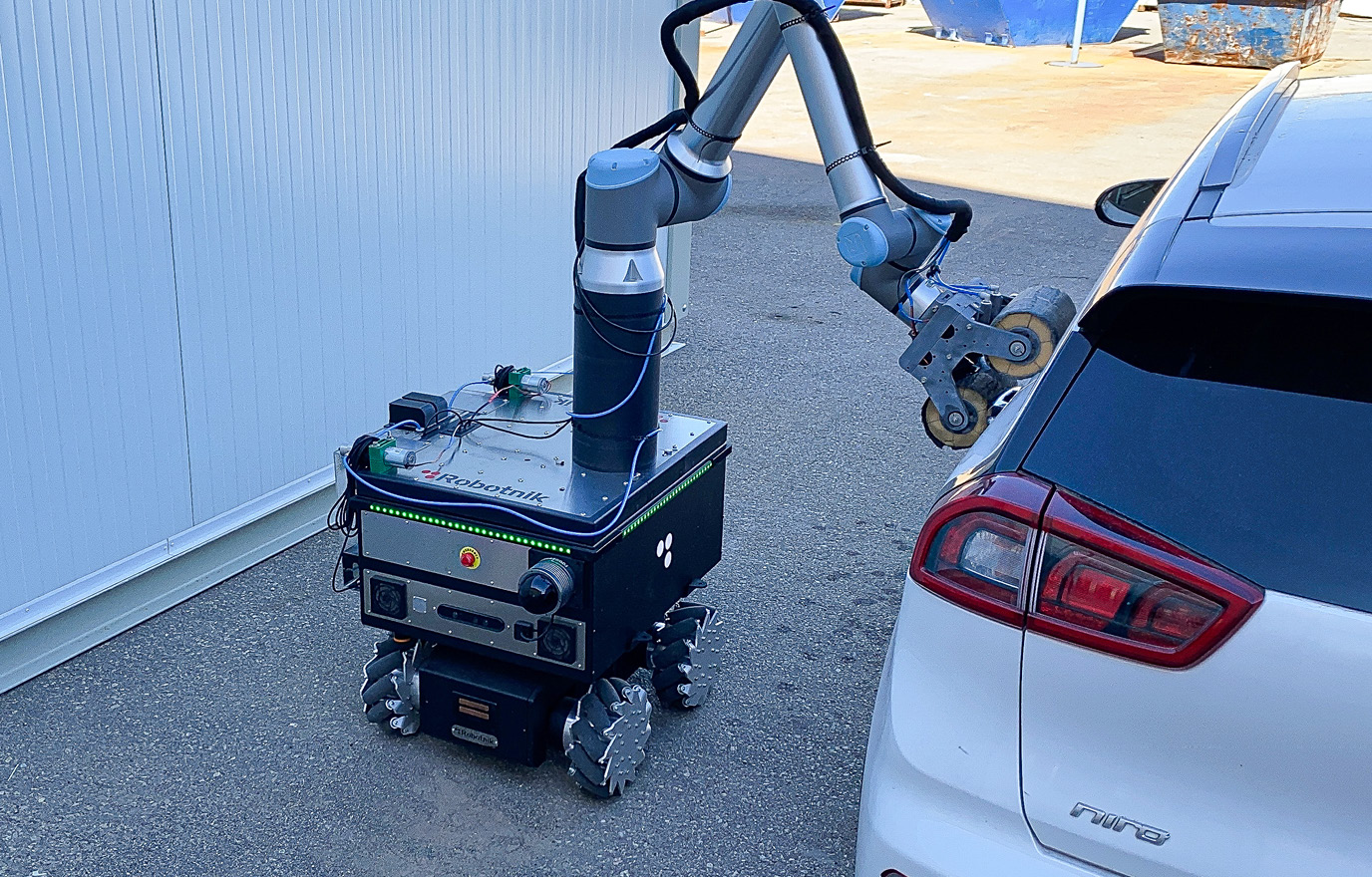
ISTOBAL: INNOVATION AND LEADERSHIP IN THE VEHICLE WASHING SECTOR
Founded in 1950, ISTOBAL is an international benchmark in the design and manufacture of vehicle washing and care solutions. The company has 16 subsidiaries and four production plants in Europe, America, and Asia, exports to more than 80 countries, and allocates 70% of its production to international sales. This positioning makes it the second-largest manufacturer in Europe and the fourth worldwide.
Since its beginnings, ISTOBAL has integrated advanced technologies into its solutions, seeking a balance between profitability, service quality, and sustainability. The adoption of mobile robotics represents another step in this strategy, aligned with the trends of digitization and automation in the industry.
MOBILE ROBOTICS APPLIED TO VEHICLE WASHING
As part of the pilot research project “Development of robotics and mobile robotics systems for vehicle washing and care”, ISTOBAL has taken a decisive step toward advanced automation with Robotnik’s RB-KAIROS+, an Autonomous Mobile Manipulator that combines precision, flexibility, and autonomy.
The key objectives of the research phase include:
-
- Reducing operating costs by automating repetitive tasks.
- Optimizing resources (water, energy, chemicals) through controlled and precise applications.
- Increasing workplace safety by limiting staff exposure to wet environments and moving machinery.
- Ensuring quality through consistent and repeatable results in every cycle.
PRACTICAL APPLICATIONS OF THE RB-KAIROS+ IN WASHING ENVIRONMENTS
Automation with mobile manipulators reduces the need for direct human intervention in wet areas, minimizing risks of electrocution, entrapment, or slipping. Furthermore, as a collaborative system, the RB-KAIROS+ can operate safely in the same workspace as human operators, without the need to fence off its area of activity.
The RB-KAIROS+ primarily takes on functions of the washing process that require precision and repeatability. In this way, it delivers consistent and reliable results while freeing operators from routine and less rewarding tasks, allowing them to focus on higher-value activities.
Some of the tasks that Robotnik’s mobile manipulator robot can perform to automate vehicle washing include:
-
- Profiling and scanning the bodywork to adjust washing parameters for each vehicle.
- Planning and executing trajectories, optimizing cycle times.
- Precise application of soaps, waxes, and treatments, minimizing waste.
- Finishing operations, where repeatability is essential for final quality.
ADVANTAGES OF MOBILE ROBOTICS: SUSTAINABILITY AND PROFITABILITY
According to the International Federation of Robotics (IFR), one of the main robotics trends for 2025 is its role in addressing labor shortages, as well as contributing to the transition toward more sustainable models.
In the vehicle washing sector, the RB-KAIROS+ clearly reflects these trends: by autonomously handling the most repetitive and demanding stages of the process, it compensates for the lack of available staff and frees operators for higher-value tasks. At the same time, its precision and efficiency reduce water, detergent, and energy consumption, aligning with the growing need for solutions that minimize environmental impact without compromising service quality.
From a sustainability perspective, precision in resource application enables:
-
- Reduced water consumption by applying exact flow rates according to the vehicle’s geometry.
- Optimized use of chemicals, avoiding overdosing.
- Lower energy consumption thanks to shorter, planned trajectories.
These factors not only reduce environmental impact but also generate a direct economic return for operating companies.
A ROBUST AND VERSATILE MOBILE MANIPULATOR ROBOT
The RB-KAIROS+ is a mobile manipulator robot developed by Robotnik that integrates, in a plug-and-play fashion, a Universal Robots e-series collaborative arm. Its architecture combines an omnidirectional mobile platform with the collaborative manipulator arm to perform tasks precisely at different locations.
Some of the robot’s main technical specifications include:
-
- Payload: up to 212 kg on the base and 16 kg on the arm.
- Autonomy: up to 6 hours of continuous operation.
- Navigation: omnidirectional platform with advanced navigation algorithms and SLAM localization.
- Safety: integration of obstacle detection systems and PLC safety controls.
Automating vehicle washing involves high-precision operations in variable, dynamic environments. From detecting the exact dimensions of the vehicle to uniformly applying chemical treatments, each phase requires accuracy and consistency.
The RB-KAIROS+ addresses these needs through:
-
- Omnidirectional mobility in tight spaces.
- Real-time obstacle detection and avoidance.
- Robust load and manipulation capacity.
- Repeatability in executing trajectories and treatments.
TECHNOLOGICAL CHALLENGES IN INTEGRATING MOBILE MANIPULATORS
The incorporation of mobile robotics into vehicle washing requires overcoming multiple technical and operational challenges. For this reason, it is essential that companies like ISTOBAL allocate part of their R&D resources to projects that explore, validate, and establish new milestones in industrial automation, contributing to the sector’s advancement and the creation of increasingly efficient and sustainable solutions tested in real environments.
Some of the challenges addressed in this integration include:
-
- Variable environments: perception algorithms must accurately identify vehicles of different sizes and shapes.
- Limited spaces: omnidirectional mobility is key to operating in the compact areas of car wash facilities.
- Collaborative safety: balancing productivity and staff protection is critical.
- Energy management: ensuring operational autonomy for several hours without compromising performance.
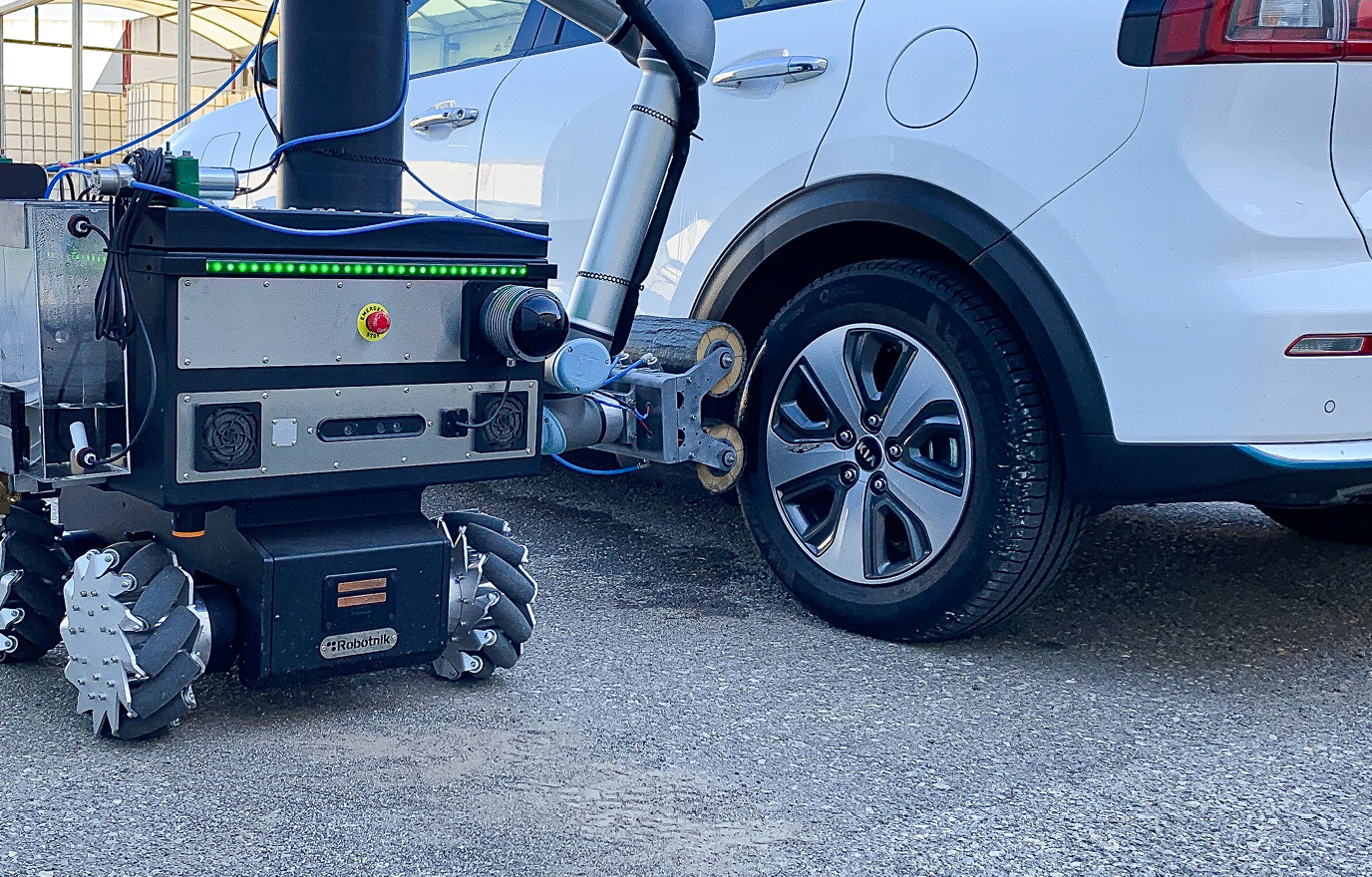
IMPACT OF ROBOTICS ON THE AUTOMOTIVE INDUSTRY
According to the IFR, the automotive sector accounts for more than 40% of global demand for industrial robots. However, this percentage is not limited exclusively to the manufacturing process. The smart factory concept goes beyond industrial production. Processes such as vehicle washing are also part of this trend toward digitization and comprehensive automation.
In this context, the RB-KAIROS+ is established as a key tool to achieve a future where robotics and autonomous mobile manipulation become part of everyday operations. The ISTOBAL project with the RB-KAIROS+ serves as a case study that anticipates the expansion of these technologies throughout the automotive ecosystem, providing tangible improvements in safety, sustainability, and productivity across an increasing number of tasks.
The RB-KAIROS+ consolidates itself as a benchmark in autonomous mobile manipulation, paving the way toward the intelligent automation of service processes. With projects like this, the industry takes another step toward the smart factory paradigm, where every operation, from production to maintenance and after-sales service, benefits from advanced robotics.
FAQS about robotics for vehicle washing
The RB-KAIROS+ is an autonomous mobile manipulator developed by Robotnik that integrates a collaborative arm and an omnidirectional platform. In the vehicle washing sector, it is used to automate tasks that require precision and repeatability, such as applying soaps and waxes, scanning the bodywork, or carrying out finishing operations.
Robots like the RB-KAIROS+ reduce workplace risks, optimize resources such as water, chemicals, and energy, improve the quality and consistency of results, and free operators from repetitive tasks, allowing them to focus on higher-value activities.
The robot reduces water, energy, and chemical consumption through precise and controlled applications, which lowers environmental impact and generates cost savings for companies.
